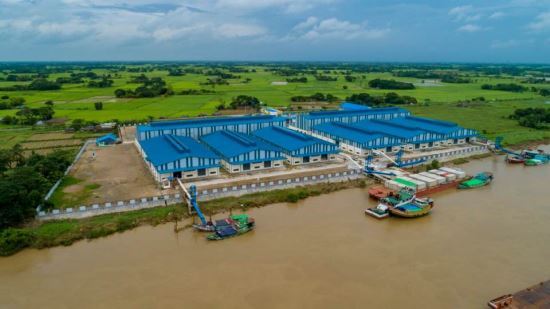Pandemic raises concerns about food supply disruptions
Calls for national grain procurement system rise
By Shin Ji-hyePublished : July 5, 2020 - 16:07

Amid the coronavirus outbreak, concerns are growing that the nation’s food supply chain may become disrupted if the pandemic is prolonged, adding weight to the calls for establishing a national food procurement system.
Last month, United Nations’ Secretary-General Antonio Guterres said even in countries with abundant food resources, COVID-19 risks disrupting food supply chains. “Our food systems are failing and the COVID-19 pandemic is making things worse,” he said.
In South Korea, although the self-sufficiency rate of rice, the staple food, is high at 97.3 percent as of 2018, the rate of other grains is starkly low, with 1.2 percent for wheat, 3.3 percent for corn and 25.4 percent for soybeans.
“If the export ban of major agricultural exporters such as Russia continues to be extended and the international logistics system continues to be suspended, prices will soar and domestic food security concerns will aggravate,” said Kim Yong-joon, a researcher at Gyeonggi Research Institute.
Russia recently restricted exports of wheat, corn and barley to less than 7 million tons, while Cambodia, Myanmar, Malaysia and Ukraine also pushed for restrictions on exports of grain-related products.
In Korea, there is no national grain procurement system.
Instead, some private companies are stepping up efforts to strengthen their position in the international grain market, contributing to national food security.
Early last year, Posco International signed a deal with Orexim Group, a Ukrainian logistics company, to acquire a 75 percent stake in a grain export terminal located in the Ukrainian Black Sea port of Nikolayev. The terminal was completed in September last year to enable the Korean trading company to control the logistics of the production, inspection, storage and shipment of grain produced in Ukraine. As of this May, sales of wheat and corn have reached about 300,000 tons and sales to China have also been on the rise, according to the firm.
“Posco International has a grain export terminal with a combined capacity of 2.5 million tons, and plans to focus on expanding the value chain of its food business while making efforts to stabilize the grain market fluctuations in the future,” the firm’s spokesperson said.
Another local trade and logistics company Pan Ocean signed a contract in May to acquire 36.25 percent of the stake in a US Pacific Northwest terminal known as Export Grain Terminal. EGT owns and operates one of the largest grain export facilities on the west coast of the US.
Pan Ocean believes the acquisition, when completed, will pave the way for its grain business to make inroads into the global market by strengthening ties with major grain exporters.
Although private firms seem to fare well, calls are also growing for the nation’s grain procurement system to be put into operation amid concerns that the spread of COVID-19 could trigger a global food crisis.
According to the 2019 survey by the Korea Rural Economic Institute, a majority of experts said that the current procurement system would struggle in the event of a food crisis. They note that procurement system involving private capital is needed based on government policy support.
“As a way to cope with the food crisis, we must ultimately activate the national grain procurement system. Since there is no way to force grain to be brought into the country in an emergency, the government’s equity investment (in private projects) is needed first,” said Choi Ji-hyun, an honorary researcher at the KREI.
In April, Vice Finance Minister Kim Yong-beom said the government was raising its guard against the food supply disruptions.
“Major international food producers such as Russia, Vietnam and Ukraine are restricting food exports,” Kim said.
“In Korea, there is room for an inventory of major food crops such as rice, but it is necessary to proactively respond through monitoring the international grain market in preparation for the prolonged export restrictions of each country.”
By Shin Ji-hye (shinjh@heraldcorp.com">shinjh@heraldcorp.com)







![[Graphic News] More Koreans say they plan long-distance trips this year](http://res.heraldm.com/phpwas/restmb_idxmake.php?idx=644&simg=/content/image/2024/04/17/20240417050828_0.gif&u=)
![[KH Explains] Hyundai's full hybrid edge to pay off amid slow transition to pure EVs](http://res.heraldm.com/phpwas/restmb_idxmake.php?idx=644&simg=/content/image/2024/04/18/20240418050645_0.jpg&u=20240419100350)






![[From the Scene] Monks, Buddhists hail return of remains of Buddhas](http://res.heraldm.com/phpwas/restmb_idxmake.php?idx=652&simg=/content/image/2024/04/19/20240419050617_0.jpg&u=20240419175937)

![[KH Explains] Hyundai's full hybrid edge to pay off amid slow transition to pure EVs](http://res.heraldm.com/phpwas/restmb_idxmake.php?idx=652&simg=/content/image/2024/04/18/20240418050645_0.jpg&u=20240419100350)

![[Today’s K-pop] Illit drops debut single remix](http://res.heraldm.com/phpwas/restmb_idxmake.php?idx=642&simg=/content/image/2024/04/19/20240419050612_0.jpg&u=)